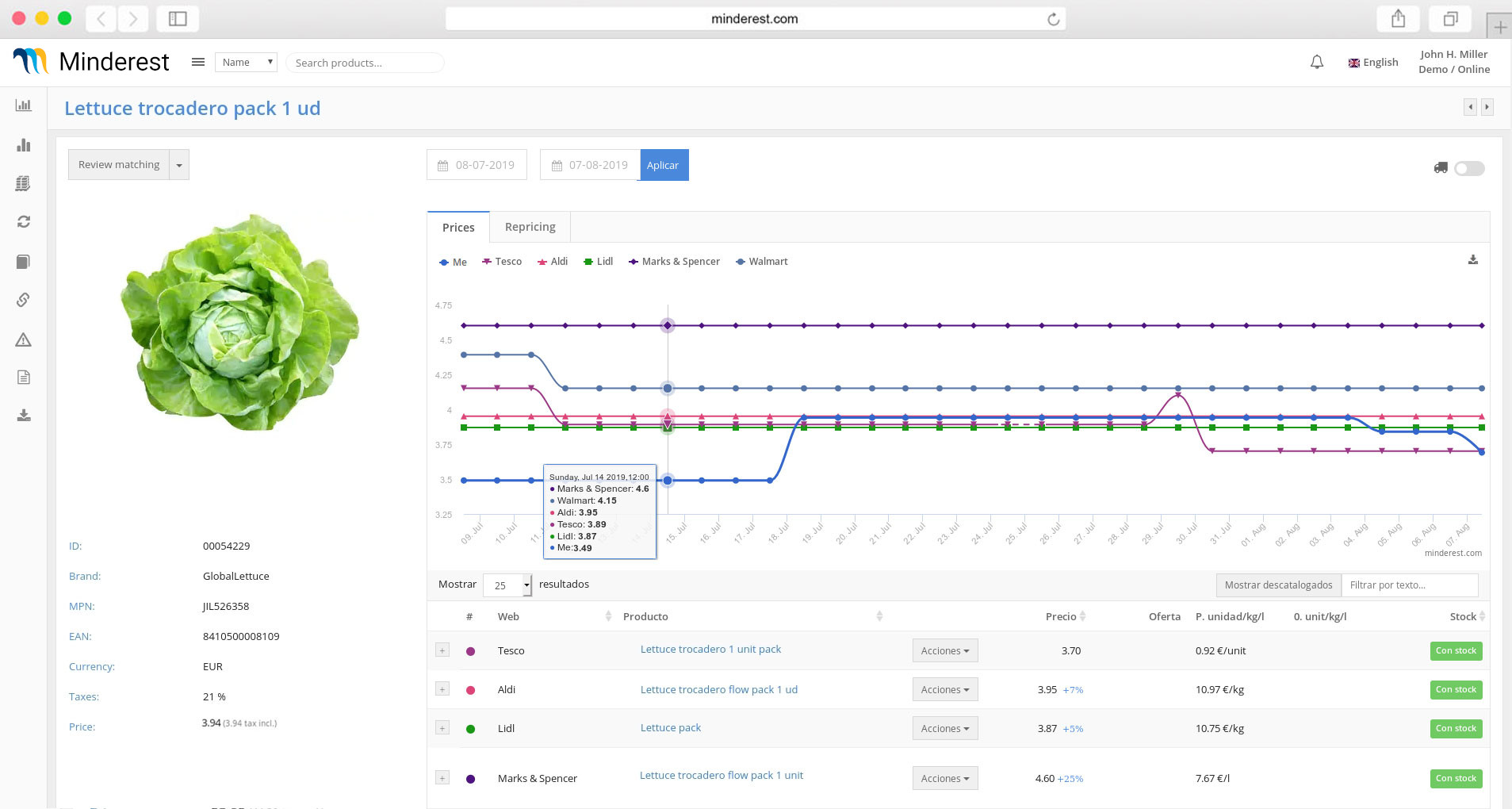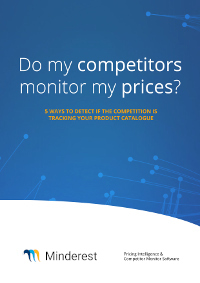Price Comparison Engine for Supermarkets
How Supermarkets can improve their competitiveness
Request demoIn price monitoring, the online Supermarket sector faces a different paradigm than the rest. Almost infinite catalogue size and a product stock that is as variable as it is sensitive mean that online supermarket price comparison must be treated in a completely different way. What should you consider when monitoring and comparing prices in online supermarkets?
Characteristics of supermarket price comparison
The online supermarket sector is characterised by having highly variable stock and not always governed by seasonality. Unlike others, such as fashion or technology, supermarket products have expiry dates, seasonal freshness, store brands... In addition, unlike other online sellers, supermarkets act both as a brand, with their own product lines, and as retailers of third-party products.
Thus, price comparison for supermarkets must be contested with different competitors. In this type of market not only other supermarkets participate, but other giants of Internet sales are also sticking their noses in and competing in the shipment of household products and groceries to consumers’ homes. In any case, whoever the competition your supermarket faces, the main stumbling block that must be overcome in this area is the numerosity of the products on sale. This makes it practically impossible to track prices by hand and preventing, in many cases, the possibility of maintaining competitiveness in the face of certain offers and price reductions.
In this sense, having an adequate price monitoring tool can be the key to update prices without fear of remaining unaware of what is happening in the market. Minderest’s supermarket price comparison software is capable of matching products by equivalence even if they are not identical to each other. In this way it is possible to make an effective price comparison between the different products of each supermarket. Let’s see, below, what the characteristics of these products are.
What products are likely to be compared in supermarkets?
Online supermarket catalogues, as we have already mentioned, are characterised by having innumerable quantities of different products. Of all of these, there are three categories that make supermarket price comparison a somewhat complicated task:
- Fresh products, which have different suppliers, different base prices and, therefore, different profit margins for the company.
- Generic products, which do not have to be identical even if they meet similar general needs.
- Products in promotional packs, which may not be available for sale in all supermarkets.
The most important thing when making price comparisons between online supermarkets is to consider what the main equivalences between them are. When it comes to brand manufacturers, it is relatively easy to see which corresponds with which. When it comes to generic products, the complexity goes up a gear. As with products that are easier to identify (like technology: laptops, smartphones, etc.), each supermarket’s products must be matched with a reference in each online store. Only this way can your business have a completely representative view of the sales reality surrounding each item in the catalogue.
The geolocation factor in supermarkets
The sale of food and household products in supermarkets has always been characterised by a very important factor: the location of the store. And now that the digital environment seems to have broken down barriers and relocated certain activities, the fact is that in the case of online supermarkets this is still not 100% implemented. Local trade products, logistics or warehousing systems in different cities mean that prices for each product may vary from region to region. Obviously, this is an added handicap to compare online supermarket prices if you want to do it by hand.
It is probably at this point where you can find the direct relationship with offline sales in supermarkets, where there are area supervisors who are responsible for doing this management. However, when multiplying this to an infinite range of possibilities per brand, product and online domain this definitely becomes an impossible task to undertake. Tools such as Minderest, for comparing prices between supermarkets, allow your business to establish comparison parameters by brand, product and, additionally, post code. This is the only way to maintain the objectives of the global computation while maintaining the performance in each of the areas of local scope.
With this functionality, Minderest’s price comparison tool allows each supermarket to set the best prices by geolocation. Our tracking software differentiates between the different post codes for shipping to and returns the information to the supermarket with the prices set by its competition for the products in each case. Thus, Minderest’s customers always have detailed information that allows them to make the best decisions in their pricing strategy.

Improve prices without losing margin
What to do once price comparisons have been completed with the competing supermarkets? The objective is to adjust the prices of your supermarket to maintain competitiveness and not lose sales opportunities.
The essential thing with this price adjustment is that changes are made on time and always maintaining the profit margin required for the online store. Bear in mind that, in addition to the beneficial selling price for the supermarket, the manufacturer itself (as long as we are not speaking about generic products), can also establish its recommended retail price. Here is where the seller must establish the necessary metrics to comply with the recommendation while the final price remains competitive and favours both the sales hook and the supermarkets’ profits.
The pricing strategy that best accompanies this monitoring and comparison of the competition is dynamic pricing. This allows prices to change in the face of competitive fluctuations. And with Minderest’s price comparison tool you can automate these changes in different cases. It is important to keep track of the times when other supermarkets make a change in their prices so as not to fall behind, but it is also vital to establish limitations to ensure the store’s profit levels. With the help of this software you can always keep track of the selling prices and the costs covered by them. Additionally, this factor will also be comparable between competitors which lets you know how the price of each product is distributed. In this way, your business will be able to establish a strategic line common to all your products compensating the values that are necessary in case they do not coincide with those of your competition.
The automation of dynamic prices via the pricing tool allows you to parameterise all the values required by your business, such as limitations on price reductions. When making offers, promotions and packs, this information is also essential. With the help of the data collected by the tool, it is possible to know, for example, which are the best products to include in the already famous promotions 2×1, 3×2 or with a certain discount on units added to the cart. Thanks to the price break-down reports you can establish actions for offers that will really generate better profits for your supermarket.
What are the advantages of Minderest’s technology for online supermarkets?
Minderest’s comparison software is one of the most powerful on the market, and this makes it very suitable for all types of online businesses. However, it has many features that make it the perfect ally for online supermarkets. Minderest is already trusted by major national and international accounts, such as Carrefour and the Auchan Group.
Firstly, as mentioned above, with Minderest’s comparison tool it is possible to track with geographical discrimination between different competitors and their products.
Secondly, our software is able to automate price changes in your supermarket by considering all factors that may influence your strategy. Thus, you can establish as many parameters as necessary, from minimum and maximum prices, to desired margins, dates, times in changes, and the prioritisation of some rules over others.
One of the strengths of Minderest’s software is its supermarket-specific matching technology. With this, you may match fresh products by similarity or equivalence, as well as private label products. Matching own brands is one of the most complex, as it requires the identification of the alternatives to be covered by each product, so it is undoubtedly a high added value for the tool. Online supermarkets are selling more and more globally. The digitisation of this task already has many followers and, therefore, homes. Online supermarkets now also need to adapt to the new online competitiveness, and to do so it is necessary to have the right technology to keep them in the battle to attract, capture and retain customers.





